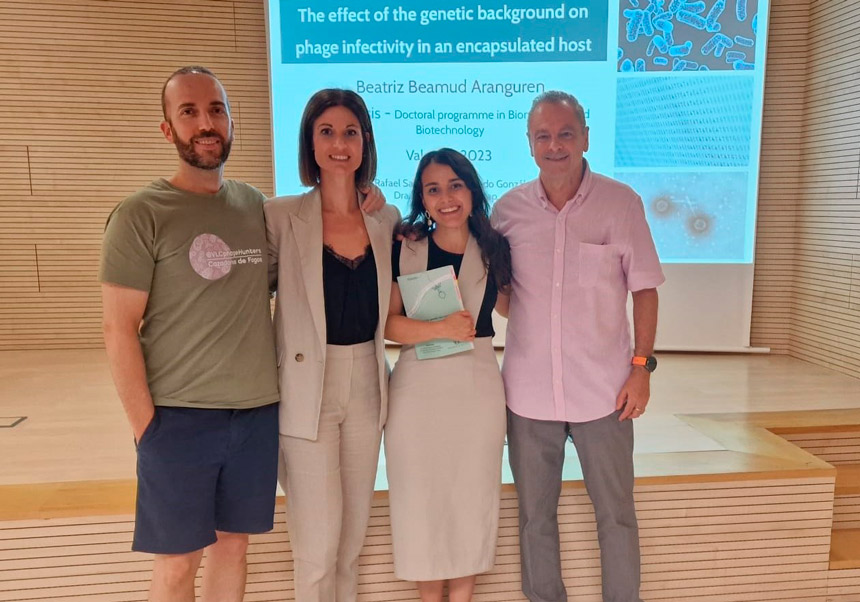Users
Social media
- More details here...
- Address
Parc Científic de la Universitat de València C/
Catedrático Agustín Escardino, 9
46980 Paterna (Valencia) Spain - Email:
iu.i2sysbio@uv.es - Phone:
(+34) 963544810
- Address
Links
Beatriz Beamud Aranguren defends her thesis on the recognition between phages and bacteria

Investigation & Education
Thesis
Beatriz Beamud Aranguren defends her thesis on the recognition between phages and bacteria

In this thesis, directed by Fernando González-Candelas, Rafael Sanjuán and Pilar Domingo-Calap, we have studied how bacteria and their viruses interact and the ability to predict this interaction through genomic analysis. Part of the results have been published in the journal Cell Reports. The thesis was defended on July 21, 2023.
Bacteriophages play essential roles in bacterial ecology and evolution and are potential antimicrobial agents. However, the determinants of phage-host specificity remain elusive. The capsule that surrounds some bacteria is the first barrier encountered by many phages. In this thesis, entitled “The effect of the genetic background on phage infectivity in an encapsulated host”, the predictability of phage-bacteria interactions has been quantified based on the type of capsular locus (CLT) of the host and the depolymerase domains (Dpos) specific for its receptor binding proteins. For this, Klebsiella pneumoniae was used as a model due to its high capsular diversity and importance for global health. A collection of 138 clinical strains ofK was generated. pneumoniaerepresentative of the genomic diversity of the species. These were challenged with 46 different environmental phages. Most phages presented capsular specificity, and their infection pattern could be accurately predicted from the host's CLT. Thus, phage-encoded Dpos, which have undergone horizontal transfer at large taxonomic scales, were key determinants of host tropism. In addition to capsule specialist phages, some were found to have a broader host range. It is noteworthy that more than 90% of the bacterial strains present capsular heterogeneity, with capsular and acapsular clones. This heterogeneity affects phage tropism, as broad-range phages preferentially infect bacteria with a higher proportion of acapsular clones, unlike capsule specialist phages. The acapsular mutants gain resistance in 286 of the 406 (70%) combinations tested. Neither phage capsule specificity nor infection of acapsular bacteria correlated with phage phylogenetic classification. 43% of the phages showed obligatory or facultative capsule binding behavior depending on the bacterial strain and its capsular inactivation mechanism, which in turn leads to different resistance compromises. These findings expand our knowledge about the complex interactions between bacteria and their viruses and point to the possibility of predicting the first steps of phage infection using the genomic sequences of phages and bacteria.
Beatriz Beamud Aranguren carried out her doctoral research in the Molecular Epidemiology group under the supervision of Rafael Sanjuán Verdeguer, professor of genetics at the University of Valencia, Fernando González Candelas, professor of genetics at the UV and Pilar Domingo Calap, researcher of the Ramón y Cajal program at the UV, all of them researchers at the Institute of Integrative Systems Biology I2SysBio (UV-CSIC) and in the mixed epidemiology and health unit (Fisabio-UV). During the development of the thesis, Beatriz Beamud spent a stay at the Synthetic Biology Unit of the Institut Pasteur (Paris) and enjoyed a contract within the University Teacher Training program (FPU). The qualifying panel was made up of Santiago F. Elena (I2SysBio, CSIC), Mária Džunková (I2SysBio, UV), and Olaya Rendueles (Institut Pasteur, Paris), who rated the thesis as outstanding.


